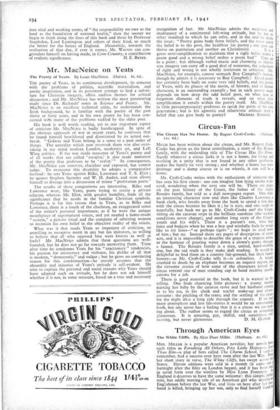Mr. MacNeice on Yeats
The Poetry of Yeats. By Louis MacNeice. (Oxford. 8s. 6d., THE poetry of Yeats, in its continuous development, its concern with the problems of politics, scientific materialism, and poetic inspiration, and in its persistent attempt to find a substi- tute for Christian imagery, offers endless themes for critical discussion ; and Mr. MacNeice has written the most penetrating study since Dr. Richards' notes in Science and Poetry. Mr. MacNeice is an excellent technical critic, he understands the Irish background, he is familiar with the poetry of the past thirty or forty years, and in his own poetry he has been con- cerned with many of the problems tackled by the older poet.
His book is well worth reading, yet in one important aspect of criticism Mr. MacNeice is badly handicapped. In spite of the obvious approach of war in recent years, he confesses that he found himself bewildered and disoriented by its actual out- break. " Galway and Yeats belong in a sense to a past order of things. The unreality which now overtook them was also over- taking in my mind modern London, modernist art, and Left Wing politics. If the war made nonsense of Yeats's poetry and of all works that are called `escapist,' it also made nonsense of the poetry that professes to be ' realist.' " In consequence, Mr. MacNeice can annotate, elucidate and expound, but cannot judge. To overcome this disability he adopts a comparative method : he sets Yeats against Rilke, Lawrence and T. S. Eliot ; he quotes Stephen Spender and W. H. Auden, and even allows himself to diverge into a discussion of minor " proletarian poets:' The results of these comparisons are interesting. Rilke and Lawrence were, like Yeats, poets trying to create a private religion, whereas Mr. Eliot, with greater humility, finds all the significance that he needs in the familiar Christian symbols. Perhaps it is for this reason that in Yeats, as in Rilke and Lawrence, there is a touch of the charlatan, an exaggerated sense of the writer's personal importance, as if he were the unique mouthpiece of supernatural voices, and yet needed a home-made " system," a private ritual and the company of admiring women to maintain his own belief in the objective reality of the voices.
What was it that made Yeats so impatient of criticism, so unwilling to recognise merit in any but his imitators, so willing to believe that all who opposed him were knaves as well as fools? Mr. MacNeice admits that these questions are well- founded, but he does not go far towards answering them. Time after time he condemns Yeats for his " reactionary " tendencies, his passion for aristocracy and violence, his dislike of all that is modern, " democratic," and vulgar ; but he gives no convincing reason for this condemnation—he merely assumes that the absurdity and injustice of Yeats's attitude is self-evident. He tries to explain the personal and social reasons why Yeats should have adopted such an attitude, but he does not ask himself whether it is not, in some measure, based on a true and necessary
recognition of fact. Mr. MacNeice admits the weakness and inadequacy of a sentimental left-wing attitude, but he has to other standard to which he can refer, and in the end he shirks the issue: " Poetry gains body from beliefs, and the more suited the belief is to the poet, the healthier his poetry ; one poet can thrive on pantheism and another on Christianity. . . , It is a gross over-simplification to maintain. that a right belief makes a poem good and a wrong belief makes a poem bad." True, uo to a point : but although verbal music and charming or impres: sive imagery can carry off a good deal of nonsense, the judgement of right and wrong is not wholly irrelevant to criticism. (Mr. MacNeice, for example, cannot stomach Roy Campbell's fascism, though he admits it is necessary to Roy Campbell.) Good poetry has certainly been built on some very odd beliefs, and the poetry of Yeats, with its phases of the moon, of history, and of human character, is an outstanding example ; but in such poetry much depends on how deep the odd belief goes, on what new or forgotten elements of truth it reveals, and on what false simplification it entails within the poetry itself. Mr. MacNeice (a little presumptuously) professes to speak for poets of his own generation ; but is his agnostic and relativistic attitude itself a belief that can give body to poetry? MICHAEL ROBERTS.


























 Previous page
Previous page